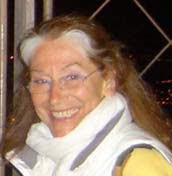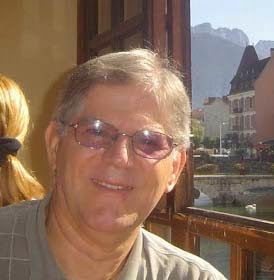 by Marc Hersch
by Marc Hersch
I was prompted to write the following post (originally a comment) by Madeleine Kando’s very evocative, bittersweet essay, “If Houses Could Speak…“ I think her post resonated for me in part, because in 2004, I too visited Amsterdam, Holland during a long layover between the Canary Islands and San Francisco. While there, I took the opportunity to visit the Anne Frank house and stroll the neighborhood. Madeleine’s post put into words a feeling I had back then. Some houses can speak.
I was born in 1947, an “American Jew”, which is to say that my family was very assimilated. My religious training wouldn't fill a thimble. The central tenet of my Jewishness consists of something my mother told me at a very tender age.
She said, "It doesn't matter if you feel like a Jew or think like a Jew or believe like a Jew. All that matters is that there are people in the world who will classify you as a Jew, and when they come for you, there is nothing you can say or do that will keep them from doing to you what they think they should do to Jews."
To be raised an atheist or agnostic, I don't know which, but be born a Jew in the still-simmering melting pot of post-WWII America, was to come of age in a kind of limbo---belonging and not belonging at the same time. As a child, the storied events of WWII were distant history to me. As sure as the sun rose each day, the storied horrors of the past could never be repeated in our enlightened age, and occasional shouts of "Jew boy" not withstanding, reason would rule the world forever and ever.
Distant-history became near-history when, soon after graduating college in 1970, I set out to travel the world. I spent my first year afoot in Europe, just another backpacking American hippie abroad.
I first encountered real Jew hatred during a frightening meeting with the police in Switzerland. They rousted me for sleeping on a bench and when I tried to explain, they shouted, “Shut up you dirty Jew!”;
In Bavaria, where I lived and worked for some time, not far from Munich and only a short time before the massacre of the Israeli athletes, I first saw the Nazi flag displayed on the walls of some small town beer halls filled with boisterously singing Germans. One time a burly German grabbed me by my shirt, spraying me with spittle as he shouted, "You MUST speak German."
I stayed for some time with a very kind family in the university town of Freiburg im Breisgau and worked at a local factory. The patriarch of the house, a one-eyed veteran of the war, was fond of saying after a few beers, "Hitler vas bad but ze var vas goot!"
Did he know I was a born Jew? I never brought the subject up.
My travels throughout Europe consisted mainly of meeting wonderful people and having delightful experiences, but my rare encounters with anti-Semitism and the vastly more ubiquitous post-WWII guilt, transformed distant-history into near-history. Paradoxically, it seemed to me, the passing of time had brought the past nearer to the present.
When I traveled the following year in the Middle East and Asia I realized that in Europe, and pretty much Europe alone, the Christian myth of the Jew as "other" is deeply rooted---more than a thousand years deep---and generally speaking (which is how we sociologists tend to speak) the peoples of Europe have little or no choice in the matter of Jews. The mythical Jew—the “other”--- is cemented into the foundation of their consciousness. They can no more will it away than give up their abiding taste for copious amounts of beer and wine.
Last year I read the recently published "The Third Reich at War" by Richard Evans. In it he gives a meticulous accounting of the disposition of European Jews during WWII. Most disturbing was that, despite some admirable exceptions, all of the nations of Europe, without exception, were complicitous when it came to ridding themselves of “their Jews” and confiscating Jewish property.
A month ago I visited friends in Israel and France and what had become near-history during my travels years ago, became now-history. As is common knowledge, liberal Europe on the whole, and France in particular, have become deeply critical of Israel. The Jews cast out from Europe were never, as the popular European story now goes, rabid ideological Zionists seeking hegemony over Palestine. They were the remnants of European Jewry who had nowhere else to go. Although Israel was granted legitimacy by the Europeans in 1948, the reality is that those who sought refuge in that faraway land found solace only in shared purpose--to survive. But their battle to survive has raged on unabated.
It seems that now-history remains in practice, the same as near-history and distant-history. The deeply rooted Christian myth of the Jew as "other" abides. The Jew continues to be seen as a secret aggressor, possessed of magical powers out of all proportion to his numbers, and he continues to work wherever he is, to undermine God's good and true natural order.
The Arab-Islamic world, in which anti-Semitism is virtually non-existent, has a very different axe to grind but has learned to use the European myth of the "other" to great advantage as they press forward with their grievances.
Like many people who have lived more than half a century, Marc Hersch’s life experiences are many and varied. Years ago he worked in the fields picking beans, in steel mills as a ladleman and in oil fields as a sandblaster. He studied the Sociology of Education at university, taught in public schools, and worked for years as a consultant to various organizations. As a youth he traveled around much of the planet with a pack on his back, mostly chasing girls. Later in life he raised a family, did what families do, and spent six years sailing with them half-way round the world and back again. He currently calls Santa Cruz, California, home as he has for 30 years. As he looks back on it all he’s not sure what to call himself at this point in the game, other than human being. Suggestions, so long as they are civil, are always welcome. Marc’s blog can be found at: http://www.3sigma.com/
leave comment here
Youtube
Contact Form
Popular Posts
-
By Madeleine Kando Flying is like signing away your rights as a human being. Not only is your life put on hold, but you never know which sid...
-
By Tom Kando Only one thing aggravates me more than the mistakes of the electorate - as exemplified by the Democratic loss in Massachusett...
-
by Tom Kando Thank you Madeleine, for your beautiful piece about Ata’s departure. I will now add my own eulogy. Just in case, here i...
-
By Tom Kando A good friend of mine recently asked me to provide her with a few comments about Mozart, and the social significance of his mus...
Tom's Publications and Essays
Madeleine's Publications and Essays
interesting links
Publish Your Article!
A valid author name is required. We will create live links to url's that you specify in your post. Please be patient, and allow us some time to read and approve your article.We reserve the right to refuse any articles that are not deemed appropriate for this blog.








